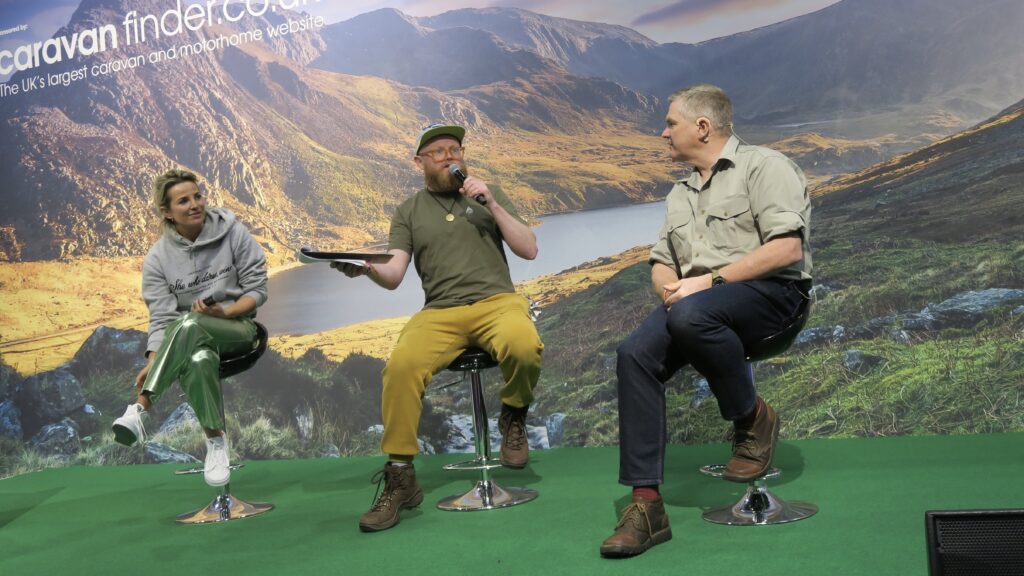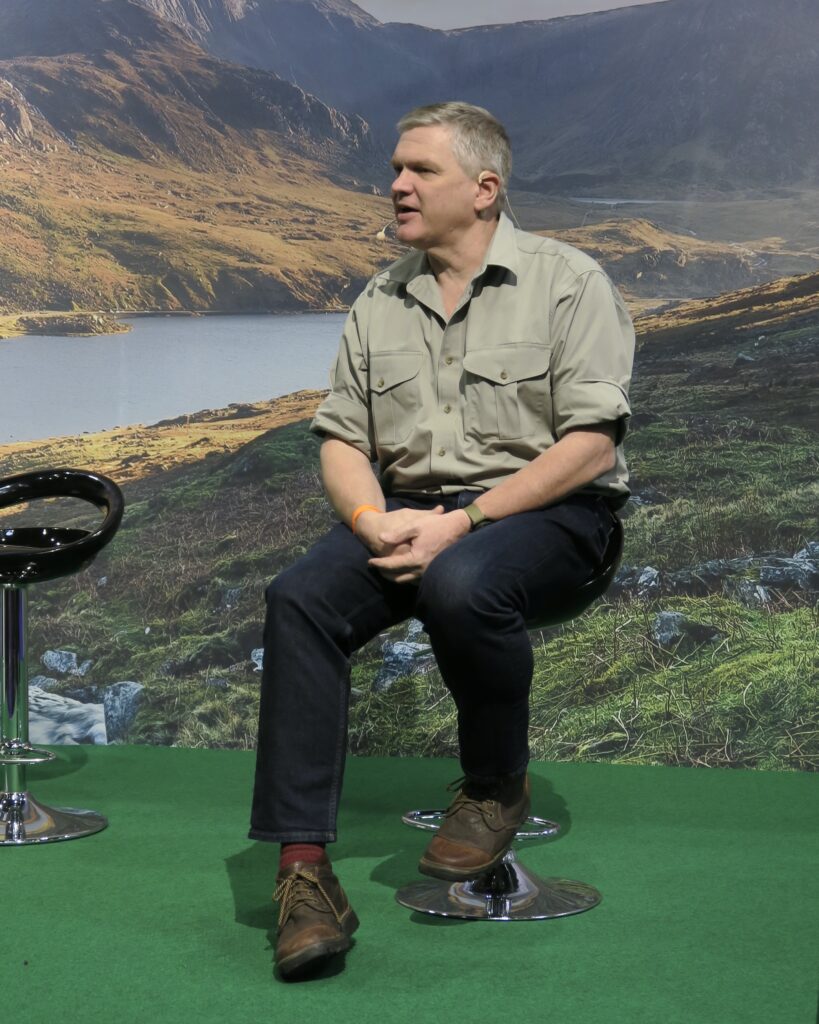Reflections from a fireside chat given by him at the National Outdoor Expo
I’ve been fascinated by Ray Mears for as long as I can remember. His early BBC documentaries weren’t just TV shows to me; they were portals into a way of life that felt both ancient and deeply relevant. As a schoolboy bivvying overnight in the woods, building shelters, lighting fires with silver birch bark I found myself connecting with many of his core lessons. So, when I found myself in the front row at Ray’s “Fireside Chat” on the Outdoor Stage at the National Outdoor Expo, it felt like a full-circle moment.

Grounded Wisdom
Right from the start, Ray spoke with that calm, grounded wisdom that’s made him a guide and mentor to so many. He began with what might seem a simple insight: the importance of understanding vegetation. For Ray, plant life is the gateway to nearly everything else in the natural world. It was classic Ray Mears: start simple, then peel back the layers to reveal the deeper tapestry.
Avoiding the Trap of “Expertise”
One of his early standout comments resonated strongly:
“We live in an age where people want to be experts. But when you say you are an expert, the door of learning shuts in your face.”
It was a timely reminder that bushcraft and, indeed, life itself is a journey rather than a destination. In an era of social media “gurus,” Ray’s concern about the proliferation of shallow or misleading outdoor advice felt especially relevant. The outdoors can be unforgiving and poor guidance can lead to more than just inconvenience. It can quickly become dangerous. Ray’s message was clear: learn from those who came before you, stay curious and humble enough to keep evolving.
Escaping the Digital Leash
At one point, Ray paused to reflect on a more modern threat to our connection with nature: our phones. He suggested that we’ve become “slaves” to devices intended to make our lives easier. Checking messages and scrolling through social feeds even when surrounded by awe-inspiring landscapes. For him, the antidote lies in building the confidence to step away from technology now and then.
“If you can’t go a day without looking at your phone,” he said, “you’re missing out on a conversation with nature.”
By cultivating outdoor skills: like navigation, foraging and situational awareness you reduce the need to rely on your phone for every question or worry that arises. In doing so, you free yourself to immerse fully in the rhythms of the wild.
Costa Rica and the Power of Solo Travel
When asked about favorite destinations, Ray spoke with real fondness for Costa Rica. He lauded its biodiversity but also emphasised the critical aspect of its political stability. Something that allows travelers to immerse themselves in nature more deeply and safely. He also touched on his love for solo wilderness travel. For him, it’s not about isolation, but about the clarity and confidence that come from making independent decisions in wild environments. Coming back from that solitude, he suggested, gives you a stronger framework for decision-making in everyday life.

Life Lessons
Ray peppered his talk with practical advice that also carried a subtle philosophy. Among his top takeaways:
- Do the right things at the right age.
- Past 50? Speed up, don’t slow down.
- When you get older and have injuries…don’t talk about them.
While it sounded lighthearted, it was also a gentle reminder: don’t let your world shrink as you age. The older you get, the more important it becomes to remain active, curious and open to learning.
Reverence for History
Ray’s respect for historic explorers shone through when he mentioned Samuel Hearne, who traveled overland to the Arctic Ocean in 1772. It wasn’t the “heroism” of the feat that Mears highlighted although rather Hearne’s humility, willingness to learn from Indigenous peoples and the “slow-travel” approach that required patience and quiet endurance.
Training and Preparedness
Throughout the conversation, Ray returned to the importance of rigorous training. He noted that many civilian outdoor enthusiasts underestimate the value of consistent practice an area he feels the military excels in. When things go wrong out in the wild, theory alone won’t save you. Practical, hands-on training ensures you can quickly pivot into the right mindset under pressure.
Inspiring the Next Generation
Toward the end, Ray issued a challenge for anyone mentoring young people:
“Without people bringing on the next generation, what will happen?”
He urged educators and mentors to link the things that excite young people: technology, exploration, personal challenges to broader academic or environmental learning. Less lecturing, more igniting curiosity.
A Quiet Voice That Resonates
Ray’s talk wasn’t flashy or sensational. It didn’t need to be. It was a steady, thoughtful reminder to observe more than we speak, to prepare well, to honour knowledge and to live lives of quiet strength and attentiveness. Both in the wild and when we return home. For me, it was also a reflection on how far I’ve come since those early bivvy trips and a renewed commitment to keep following that path of lifelong learning he’s always championed.
In short, Ray Mears remains a voice of calm authority in a world overflowing with noise. His words at the National Outdoor Expo reminded us that the deeper truths of bushcraft and wilderness living lie not in short-lived social media trends but in the patient art of observation, respect and letting go of the digital leash; if only for a little while.
For more about the National Outdoor Show this year have a read of: https://richardcole.me/2025/03/national-outdoor-expo-2025